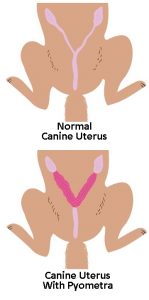Pyometra in simple terms is an infection in the uterus. It can happen in any entire/intact female, but we most commonly see it in middle aged –  elderly female dogs. Pyometra results from chronic cystic changes that occur within the inner lining of the uterus – called the endometrium. Every time an intact female goes through a phase of oestrus or “a heat” and is not mated, the hormonal signals sent to the uterus result in progressive cystic changes. Eventually these changes result in the endometrium becoming inflamed and bacteria from the vaginal canal track upwards through the cervix resulting in infection of the cystic endometrium. If the cervix then closes, the uterus fills up with infected fluid (“pus”) and septicaemia or uterine rupture can result. For these reasons pyometra is a potentially life-threatening condition and constitutes an emergency.
elderly female dogs. Pyometra results from chronic cystic changes that occur within the inner lining of the uterus – called the endometrium. Every time an intact female goes through a phase of oestrus or “a heat” and is not mated, the hormonal signals sent to the uterus result in progressive cystic changes. Eventually these changes result in the endometrium becoming inflamed and bacteria from the vaginal canal track upwards through the cervix resulting in infection of the cystic endometrium. If the cervix then closes, the uterus fills up with infected fluid (“pus”) and septicaemia or uterine rupture can result. For these reasons pyometra is a potentially life-threatening condition and constitutes an emergency.
Diagnosis
Pyometra is generally diagnosed by appropriate clinical signs being present in an entire female. Most commonly it will present around 4-6 weeks after their last heat. Vague signs such as lethargy, vomiting, abdominal discomfort and increased drinking and urinating are often present (but not always). If a vaginal discharge is present this lends to a strong suspicion of pyometra, however, it is not always present.
There are two types of pyometra – open and closed. Open pyometra occurs when the cervix is open and therefore the pus is able to drain from the uterus and out through the vagina (in which case a vaginal discharge will be noted). Closed pyometra occurs when the cervix is closed and it is the more life-threatening of the two types. Closed pyometra is more likely to result in septicaemia and uterine rupture. Diagnosis of pyometra is aided by radiography and abdominal ultrasound which confirms the presence of a dilated, non-pregnant uterus. Blood tests are also usually done and often show high white blood cell counts, septicaemia and dehydration.
Treatment
Treatment at Southern Animal Health of pyometra involves aggressive intravenous fluid therapy, systemic antibiotics, pain relief and surgical removal of the infected uterus (ovariohysterectomy). This procedure is very different to the procedure that is performed when a female is speyed or desexed, as the uterus and supplying blood vessels are much more dilated and engorged. Hence the procedure takes much longer than a standard spey.
Prognosis
Most cases of pyometra carry a favourable prognosis, however, if uterine rupture occurs or if medical treatment is delayed then the prognosis is guarded to poor.
Prevention
Speying female dogs reduces the risk of pyometra by 100%. This procedure is generally done around 6 months of age and is carried out at a discounted rate at SAH as a community service and to encourage owners to desex their pets. Younger dogs and cats tend to recover much faster from these procedures than older animals, however, it is never too late to have a female speyed.
View our surgeons performing this surgery however please be warned, it is graphic.

‘Bella’ the Bulldog Cross
Bella is a 9½ year old entire female Bulldog cross who presented to us at Southern Animal Health late on a Sunday afternoon, 6-8 weeks after her last oestrus cycle with a four day history of vomiting, inappetence and lethargy. On physical exam she was found to be dehydrated, have a bloated abdomen and a purulent (pussy) vaginal discharge. Abdominal x-rays were performed confirming fluid filled loops seen in the region of the uterus. A full haematology and biochemistry blood analysis was also performed and showed a very high white blood cell count, electrolyte changes, and protein loss. Bella was stabilised on IV fluids, pain relief and IV antibiotics and scheduled for surgery first thing the next morning once re-hydrated and stable.
Bella had surgery to remove her infected uterus first thing the next morning. Her uterus weighed about 4kg (a normal non-pregnant uterus usually weighs no more than 100g), was particularly delicate and ruptured easily after removal from the abdomen, suggesting that had treatment been delayed any longer, Bella may not have survived. She came through the surgery really well, was much more comfortable post-operatively and eating by the afternoon. She stayed in hospital on IV medications and fluids one more night to aid in flushing toxins from her body and ensuring a quicker recovery. She was sent home with a course of broad spectrum antibiotics and pain relief and by the next day, her dad reported that she was back to her normal bouncy self.
Unlike most general practices, SAH is open late on weekends and is able to provide services that may otherwise require going to a 24-hour emergency clinic and sometimes costing 3-4 times as much. Without prompt veterinary treatment, dogs like Bella may unfortunately sometimes have to be euthanized.
If you or anyone you know would like advice about desexing your female dog or cat, please feel free to contact one of our friendly staff members on (03) 9584 6100 to have a chat.
